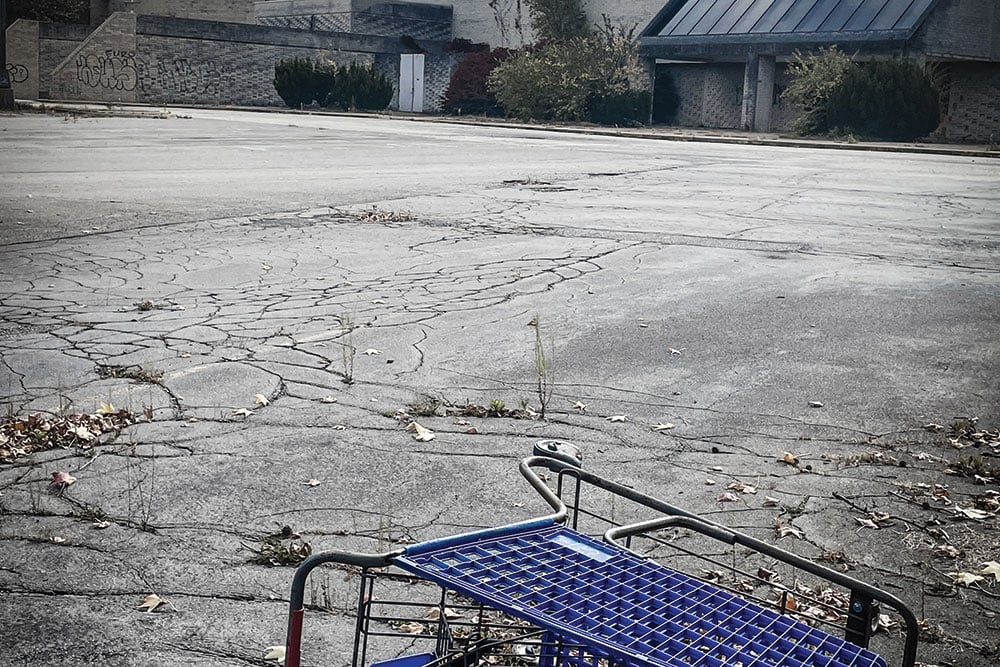Sheetz: How Did a Chain of Gas Stations Become Cool?
The family legacy continues for the growing convenience-store chain that sells whimsy on the side.
Of all Sheetz’s foods, the new boss’ favorite is a “shmuffin” — an English muffin stuffed with his choices of meat, egg, cheese and spread.
“I love that you can order breakfast all day long,” says Travis Sheetz, 52, president and CEO since January of his family’s surging chain of convenience stores, noting he was always frustrated missing limited breakfast hours at other restaurants by a few minutes as a kid.
He’s the nephew of founder Bob Sheetz and the fifth family member to take the helm of this 70-year-old, Altoona-based company. The chain has evolved into an unlikely sensation that even the Pennsylvania lieutenant governor raves about.
All-day (and all-night) breakfast hardly explains the phenomenon. Or why the store is a destination photo op for wedding parties. Or why it’s been the topic of a podcast series, “Freakz in the Sheetz.” Or why a fan known as the Million Mile Lancer traipsed across the commonwealth to take pictures of every single Sheetz in the state. Or why customers would even think of ordering the delivery of its convenience-store fare through DoorDash and other such services.
Travis marvels, “When has a gas station been cool?” He credits the store’s funny name, funny slogans, peppy staff, round-the-clock hours and diverse, ever-changing merchandise for generating a younger audience than the typical convenience chains.
“It’s the unapologetic side of our brand,” he says. “We’re like a judgment-free zone. You can do whatever you want [at] whatever time you want.”
The privately held company now has about 650 stores spread across six states — all open 24/7/365, selling food, gas and other goods, many of them under names with extra helpings of “sh” and/or “z.” The bustling brick stores with vivid red signs draw about 1.5 million customers per day, many of them rewards and loyalty cardholders classified by their outlays as Fanz, Friendz or Freakz. The chain also has about 1.4 million Facebook followers, who typically extol it.
“Some say Disney is the greatest place on Earth,” one follower has posted, “well, they have never been to a Sheetz!!!!!” As it often does, the company replied. “Disney closes every night. Sheetz never closes.”
Pennsylvania Lt. Gov. John Fetterman loves to tout the company. In 2020, he tweeted at his Texas counterpart, Dan Patrick, who offered a reward up to $1 million for evidence of voter fraud during the presidential election.
“I got a dude in Forty Fort, PA who tried to have his dead mom vote for Trump,” Fetterman tweeted, in claiming the reward: “I’d like mine in Sheetz gift cards pls.”
Team Sheetz or Team Wawa
To be clear, Sheetz isn’t the only convenience store chain that’s won such a passionate following. On the other side of Pennsylvania, near Philadelphia, is Wawa. It’s another privately held company with a funny name, taken from its home location of Wawa Township. The Wawa chain is younger — celebrating its 58th year in 2022 — and has about 250 more stores than Sheetz. The chains follow similar business models and offer some of the same popular amenities — surcharge-free ATMs, rewards programs and self-serve, touchscreen food ordering.
Enthusiasts of these storied rivals vie as fiercely as Eagles and Steelers fans, with customers pledging their loyalties to either Team Sheetz or Team Wawa. Still, a member of each company’s founding family has served on the other’s board, and the companies have teamed up to support causes such as the Special Olympics.
As a quality workplace, however, Sheetz ranks much higher than Wawa, at least by criteria set by Fortune and Forbes magazines. The store just moved up on Fortune’s “100 Best Companies to Work For,” vaulting 50 places from No. 83 in 2021 to No. 33 in 2022. Among the reasons, Fortune pointed out that Sheetz raised wages by $3 an hour in 2020 and then another $2 an hour in 2021. (Entry-level store workers average $14.50 per hour.) Wawa didn’t make the list.
On Forbes’ 2022 list of “America’s Best Large Employers,” Sheetz ranked No. 183 out of 500 companies — the highest of any Pittsburgh-area company on the list. Wawa was No. 404.
Sheetz has stores in North Carolina, Maryland, Virginia, West Virginia, Ohio and, of course, its home state, employing more than 23,500. The company also opened an innovation center in 2019 at Bakery Square in Larimer, hoping to tap into local tech talent. Forbes ranks Sheetz as the nation’s 75th biggest privately held company.
By Travis’ estimate, Sheetz grosses $8 billion a year. He credits part of its success to listening to customers. “We don’t decide what we sell,” says Travis. “Consumers do.”
“We want to be a one-stop shop,” Travis says. “Nobody in the car can veto Sheetz, because we have such a big menu.” Sheetz.com claims that the company’s fare rivals that of any fast-food outlet. Then again, Travis says, “we’re never going to have the most exotic ingredients … We would never be rewarded for that.”
How it Started
The company’s history is chronicled in Kenneth Womack’s 2013 “Made to Order: The Sheetz Story.” It turns out that the family name used to be Sheets; Jerry Sheets married into the family that owned J.E. Harshbarger Dairy Co., the biggest such business between Philadelphia and Pittsburgh. When Jerry attended a dairy conference, he loved the misspelled version — ending in z — that appeared on his nametag. He loved it so much, in fact, that he changed his name and birth certificate in the 1930s.
A family member in the 1940s opened a few Sheetz Dairy Stores to sell the excess milk. But today’s Sheetzes consider the current business to have begun in 1952, when Travis’ uncle, Bob Sheetz — the son of Jerry — bought one of those stores.
In 1973, the growing chain installed self-service gas pumps. The mid-1980s brought MTO — its made-to-order menu of burgers, pizza, burritos, subs, battered Oreos, fried pickle chips, “curly fryz,” “cinnapocketz” and much more. A decade later, touchscreens were introduced to make MTO creations more accurate. In the 2010s, Sheetz’s “Free My Beer” campaign helped to loosen Pennsylvania’s restrictions, for the first time allowing beer to be sold in convenience stores. Sheetz has also added electric car chargers.
Some innovations flopped. An early car wash froze. The company closed a Haagen-Dazs store in Oakland and Chicken Charlie’s stores there and elsewhere. “We’re always willing to test and learn,” says Travis.
In 2004, a contractor’s tomatoes gave many Sheetz customers salmonella. Overruling nervous advisors, leaders publicized the outbreak, offering to cover treatments and lost wages. Sheetz was absolved for the outbreak — but still boosted inspections and other safeguards.
The company likes to serve up catchy slogans, from “Why the Sheetz Not?” to “I’m sorry for what I said before my shnack wrap.” OK: maybe “Total Customer Focus” — its core mission, developed in the 1980s — isn’t quite as catchy. (Maybe it should be “Focuz.”)
Mike Sutherland of Swissvale likes the funny promotions. He and Alyse Richmond of Wilkinsburg hosted the “Freakz in the Sheetz” podcast, recording 30 episodes from 2018-20. He said they may record more in the future.
Sutherland said the duo had been looking to do some sort of podcast reviews, “and it seemed funnier to do food from a gas station.”
His first memory at Sheetz is of ordering a turkey sub with ketchup. The server called it a first. “Sheetz is kind of cool,” he says. “They have cool, good food. It is an endless menu. It’s cheap. They run funny promotions. They use the word ‘Sheetz’ with a wink.”
Not all of his reviews are raves, however. “Some of the food is trash,” he says. And he feels the company could have enforced masks and social distancing better during the height of the coronavirus pandemic.

SHEETZ CEO TRAVIS SHEETZ TALKS TO TRAVIS HARP, THE MANAGER OF SHEETZ AT 3109 WASHINGTON PIKE IN BRIDGEVILLE, ON A RECENT VISIT TO THE STORE | PHOTO BY GRANT SEGALL
Now and the Future
Sheetz remains officially headquartered in the Blair County city of Altoona, but Travis works at a company campus with soaring, glass spaces in outlying Claysburg. He’s the second of six children of the late “Big Joe” Sheetz, Bob’s brother and colleague.
He earned a bachelor’s degree in finance from Penn State and a master’s of business administration from Vanderbilt University. He interned with Howard Hanna Real Estate and planned to become a business consultant. Then “my family came knocking,” hiring him to find sites for stores near Pittsburgh.
Travis rose in 2018 to company president and chief operating officer. This past January, while remaining president, he became CEO too, succeeding big brother Joe, now executive vice chairman.
Travis is married, with four children and two dogs. He says the kids get teased and questioned about their surname more than he ever did, since it’s more recognizable today. They’re often asked if they get free food at the stores — “which they don’t, by the way.”
Sheetz never stops evolving. “Our vision is to put the Sheetz as we know it today out of business,” says Travis. Among other changes, he expects the new business to have many new products, more electric car chargers, and more diverse workers. The company has also signed a deal to power nearly 70% of its Pennsylvania facilities with renewable energy by 2024.
Industry experts praise Sheetz’s leaders. “They are really good at listening to their customers,” says Jeff Lenard, vice president of strategic industry initiatives for NACS / Advancing Convenience & Fuel Retailing. “They are really good at listening to their employees.”
“Sheetz is historically one of the most successful [convenience]-store retailers at driving traffic into its stores,” says Steve Holtz, content director for the industry’s CSP (formerly Convenience Store Petroleum) publications.
“They’re remarkable,” says Professor Fred Hurvitz, a Penn State expert in retail. “They’ve innovated and made the right decisions.”
The company used to have many stores within the City of Pittsburgh but closed the last locations in the 1980s. In 2021, a prankster frustrated local fans by posting a sign at a construction site on Forbes Avenue near the University of Pittsburgh in Oakland, promising a Sheetz there.
Today’s typical Sheetz occupies about 2 acres, which can be hard to find in the city. Still, there are small Sheetzes without gas at Penn State and Indiana University of Pennsylvania. Travis won’t rule out such a store in Oakland someday.
Travis isn’t seeking to expand in more states, but hopes over the next five years to give his current states 40 to 50 more stores per year — a few of which might supplement the current 80 in Greater Pittsburgh. “Pittsburgh’s a good community for us,” he says. “We consider it like an extension of our home.”
But expansion often means clashes. “People love Sheetz. They just don’t want to live next to a Sheetz,” Travis says. “I get it.”
Some Virginians recently wrote to Altoona residents asking them to pressure the company to stop or scale back plans for a Sheetz on part of a Civil War battlefield outside the battle’s official preserve. Travis was undeterred: “There were battles everywhere.” But a rezoning request has been withdrawn for a Sheetz on the site of an Ohio trailer park whose residents objected. “We don’t want to put people out of their homes,” he says.
Fetterman, the lieutenant governor, first fell for one of the Sheetzes near his childhood home of York on the aptly named Memory Lane. “They just have everything you could need on the road,” he says. “Anyone that has picky eaters for kids can find something there that they’re happy with.”
He wishes the workers were unionized. Of the owners, however, he says, “As far as I know, they are good overall corporate citizens.” The business, family and workers support Make-a-Wish, Feeding America, Sheetz health and entrepreneurial centers at Penn State Altoona, and many other causes.
Now active in the company are 13 members of the Sheetz family, the most ever. Travis hopes to add more, but there’s no rush. “We would encourage you to work elsewhere first. We’d like you to bring something back.”
Will his children join? “It’s up to them. There’s no expectation … We want our family to come back but at their choice and for the right reasons.”
Travis says his oldest, 24, is “pretty noncommittal. He’s living in New York City.” Then Dad smiles. “Things change, right?”





















